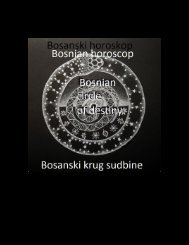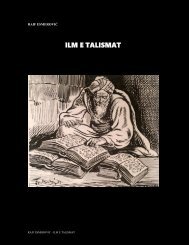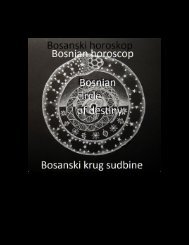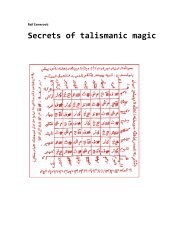Cult of fertility among the Bosnian People
In order to write credibly and in detail about the cult of fertility of the Bosnian people, it is necessary to start from the beginning which goes back to the ancient times and speaks about our famous forefathers the Illyrians, and one of their most important deities - snake. Namely, Illyrian cult of the snake as a primary symbol of fertility in folk religion of the Bosnian people, is not only noticeable in the belief about the home snake - protector of the family, i.e. totem of the head of the family, usually a male, i.e. father, but also her sacred meaning. The snake cult, on which the genesis of the grandfather of our forefathers is based on, has an even wider meaning and significance.
In order to write credibly and in detail about the cult of fertility of the Bosnian people, it is necessary to start from the beginning which goes back to the ancient times and speaks about our famous forefathers the Illyrians, and one of their most important deities - snake. Namely, Illyrian cult of the snake as a primary symbol of fertility in folk religion of the Bosnian people, is not only noticeable in the belief about the home snake - protector of the family, i.e. totem of the head of the family, usually a male, i.e. father, but also her sacred meaning. The snake cult, on which the genesis of the grandfather of our forefathers is based on, has an even wider meaning and significance.
- TAGS
- raif-esmerovic
You also want an ePaper? Increase the reach of your titles
YUMPU automatically turns print PDFs into web optimized ePapers that Google loves.
ground and she or someone else<br />
steps on it. If she becomes a<br />
victim <strong>of</strong> spellbound eyes or her<br />
own recklessness, and loses her<br />
milk, by <strong>the</strong> advice <strong>of</strong> <strong>the</strong> mo<strong>the</strong>r<br />
in law, she will look <strong>among</strong> her<br />
neighbours for some trahana (small<br />
dough used for soup) three years<br />
old, which she will cook at her<br />
home three times and eat, <strong>the</strong> milk<br />
will <strong>the</strong>n return.<br />
News <strong>of</strong> <strong>the</strong> new member in <strong>the</strong><br />
family spread fast, especially if<br />
a son was born, and <strong>the</strong>n <strong>the</strong><br />
spread <strong>of</strong> <strong>the</strong> news would become a<br />
small competition because <strong>of</strong> <strong>the</strong><br />
monetary reward which was given to<br />
<strong>the</strong> messenger. It is still today<br />
called muštuluk (good news).<br />
There was also a custom to rip <strong>the</strong><br />
shirt <strong>of</strong> <strong>the</strong> fa<strong>the</strong>r on <strong>the</strong> chest<br />
when <strong>the</strong> good news is given to him,<br />
obviously that ritual had its<br />
origin in <strong>the</strong> pagan beliefs and<br />
rituals <strong>of</strong> <strong>fertility</strong>. Namely, a<br />
ritual recorded in Vlasenica<br />
describes that a woman in late<br />
pregnancy during <strong>the</strong> period <strong>of</strong><br />
full moon would knead bread, and<br />
when <strong>the</strong> full moon showed up she<br />
would go around <strong>the</strong> house three<br />
times. She would break <strong>of</strong> one<br />
piece <strong>of</strong> bread and store it, <strong>the</strong><br />
rest she would eat. When she gave<br />
birth she would <strong>the</strong>n again wait<br />
for a full moon in order to rip<br />
<strong>the</strong> first shirt she made for her<br />
child at <strong>the</strong> chest and she would<br />
pass through <strong>the</strong> hole in <strong>the</strong> shirt<br />
<strong>the</strong> piece <strong>of</strong> bread that she made.<br />
She would <strong>the</strong>n put <strong>the</strong> shirt on<br />
<strong>the</strong> child uttering: "As <strong>the</strong> moon<br />
is full in <strong>the</strong> sky, so may you be<br />
full as well." After a few months,<br />
when <strong>the</strong> child starts eating food<br />
o<strong>the</strong>r than his mo<strong>the</strong>r's milk,<br />
during <strong>the</strong> night <strong>of</strong> a full moon<br />
<strong>the</strong> mo<strong>the</strong>r would submerge that<br />
piece <strong>of</strong> bread into cow's milk and<br />
would give it to <strong>the</strong> child<br />
repeating <strong>the</strong> same formula.<br />
The mo<strong>the</strong>r and <strong>the</strong> child usually<br />
never left <strong>the</strong> house until <strong>the</strong><br />
period <strong>of</strong> 40 days has passed, and<br />
during <strong>the</strong> first few days <strong>of</strong> <strong>the</strong><br />
child's birth one would avoid<br />
giving or loaning to o<strong>the</strong>rs in <strong>the</strong><br />
household, it was even forbidden<br />
to take out <strong>the</strong> trash when night<br />
fell. <strong>People</strong> took care not to<br />
bring in children's clo<strong>the</strong>s which<br />
were washed and dried after sunset,<br />
until <strong>the</strong> sun has come out <strong>the</strong><br />
next day and has warmed up <strong>the</strong><br />
clo<strong>the</strong>s. O<strong>the</strong>rwise <strong>the</strong> child could<br />
suffer from a disease called<br />
mračnica.<br />
One foot in <strong>the</strong> grave<br />
Though <strong>the</strong> entire cult <strong>of</strong><br />
<strong>fertility</strong> <strong>among</strong> <strong>the</strong> <strong>Bosnian</strong> people<br />
in <strong>the</strong> past was based on magicalreligious<br />
beliefs and rigid social<br />
Raif Esmerović<br />
38<br />
<strong>Cult</strong> <strong>of</strong> <strong>fertility</strong> <strong>among</strong> <strong>the</strong> <strong>Bosnian</strong> <strong>People</strong>

















